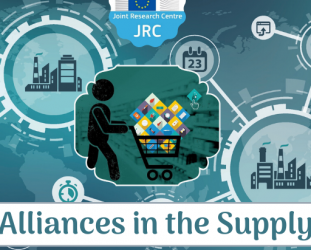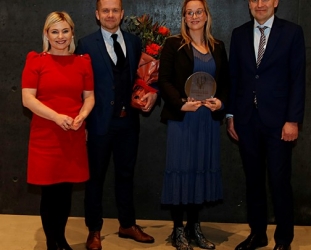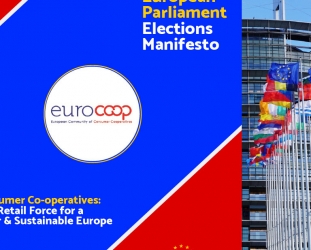Co-operative enterprises commit to United Nations Sustainable Development Goals
30.06.2016 10:45:56

In a high-level meeting in New York with representatives of the United Nations, on Wednesday 29 June 2016, Monique F. Leroux, President of the International Co-operative Alliance, pledged the co-operative movement’s commitment to the United Nations Sustainable Development Goals. As sustainable, people-focused businesses, fostering decent work and inclusion, co-operative enterprises will play an essential role in implementing the 2030 Agenda for Sustainable Development (click to read president Leroux' speech).
“I am honoured to affirm today our commitment to the Sustainable Development Goals. Co-operatives are key partners for achieving the United Nations’ 2030 Agenda, since our values and principles run parallel to the Sustainable Development Goals”, said Leroux.
In September 2015, UN Member States adopted the 2030 Agenda for Sustainable Development. The Agenda recognises co-operative enterprises as important players within the private sector to achieve the SDGs. Co-operative businesses, due to their unique member-based model and roots in the communities where they operate, have the power to build a better living for all.
Sustainability is one of the five priorities of the Blueprint for a Co-operative Decade, the global strategy for and by co-operatives to take co-operation to a new level by 2020. The Alliance is working with the FAO and ILO to identify concrete targets and indicators for co-operatives to better evaluate their contribution to the SDGs. The 2016 International Summit of Co-operatives has also a rich program based on the theme “Co-operatives: The Power to Act”. It will dedicate a full day to the topic of achieving the SDGs while gathering co-operators, global agencies, and world-renowned experts towards resolving these global issues.
“It is important for the Alliance to share its work with the United Nations as the co-operative movement contributes in a tangible way to the SDGs. The co-operative business model needs to be promoted and shared because co-operative enterprises foster democracy, social inclusion and operate with concern for the environment. Co-operatives are sustainable businesses that have the power to act at local, national and international levels”, concluded Leroux.
The co-operative movement’s commitment was pronounced at a high-level meeting in the presence of Mrs Daniela Bas, Director for Social Policy and Development (UN Department of Economic and Social Affairs), H.E. Marc-Andre Blanchard, Ambassador and Permanent Representative of Canada to the United Nations, and H.E. Sukhbold Sukhee, Ambassador and Permanent Representative of Mongolia to the United Nations. Also present were Carla Mucavi, Director of the FAO Liaison Office, and Vinicius Pinheiro, Director and Special Representative of the ILO to the UN.
Latest Enterprises Policy news

Launch: EU Code of Conduct
On 26 January, Euro Coop, Independent Retail Europe and EuroCommerce joined the EU...

Press Release - JRC Report: Retail Alliances
Read in PDF . On 13 May 2020, the Joint Research Center (JRC) of the EU Commission...

Unfair Trading Practices Heating Up Brussels
Members of European Parliament from the Agricultural Committee voted in favour of extending the...
Latest Enterprises Policy stories

European Retail Day
4 March 2020, Brussels The second European Retail Day – a joint...

Coop Iceland Receives Business Education Award
Samkaup , Coop Iceland's retail chain has been awarded the country's Business...

Manifesto: EU Elections 2019
The Manifesto for the European Parliament Elections outlines the key policy...

